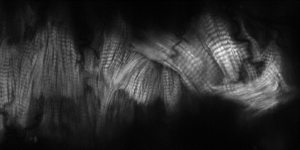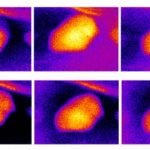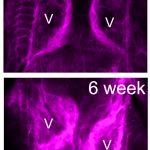
Every beat of the heart is finely tuned to eject a certain amount of blood. As we exercise, more blood flows into the heart, the cardiac muscle stretches and this leads to an increased force of contraction. Known as the Frank-Starling law, it is one of the most important aspects of human cardiac physiology but the molecular mechanisms are not entirely understood.
We do know that increases to the calcium levels in the heart cells (cardiomyocytes) support stronger contractions (anyone remember the ‘sliding ratchet model’ from GCSE biology!?) but how this calcium is regulated by stretch is not fully understood. What my colleagues and I have established (to be published in Frontiers of Physiology) is that a ‘mechanosensitive’ protein known as Piezo helps increase calcium when the cardiomyocytes are stretched. A lot of this work was done at BU’s Drosophila (fruit fly) genetics facility in Dorset House, using physiological tests of heart function in flies without the Piezo protein. When stretched, normal hearts respond by releasing more calcium and they continue to beat. In Piezo mutants, there’s no increase in calcium and the hearts often stop beating.
This is an important observation that contributes to our fundamental understanding of cardiac physiology and points to Piezo as a protein of considerable interest when considering the underlying causes of cardiac dysfunction in disease and ageing.
Paul Hartley.
(The image shows the contractile protein ‘scaffold’ within an insect heart)
 Kidneys are calciyummy!
Kidneys are calciyummy! Molecular basis for a healthier heart…new work published by BU
Molecular basis for a healthier heart…new work published by BU










 Expand Your Impact: Collaboration and Networking Workshops for Researchers
Expand Your Impact: Collaboration and Networking Workshops for Researchers Visiting Prof. Sujan Marahatta presenting at BU
Visiting Prof. Sujan Marahatta presenting at BU 3C Event: Research Culture, Community & Can you Guess Who? Thursday 26 March 1-2pm
3C Event: Research Culture, Community & Can you Guess Who? Thursday 26 March 1-2pm UKCGE Recognised Research Supervision Programme: Deadline Approaching
UKCGE Recognised Research Supervision Programme: Deadline Approaching ECR Funding Open Call: Research Culture & Community Grant – Apply now
ECR Funding Open Call: Research Culture & Community Grant – Apply now ECR Funding Open Call: Research Culture & Community Grant – Application Deadline Friday 12 December
ECR Funding Open Call: Research Culture & Community Grant – Application Deadline Friday 12 December MSCA Postdoctoral Fellowships 2025 Call
MSCA Postdoctoral Fellowships 2025 Call ERC Advanced Grant 2025 Webinar
ERC Advanced Grant 2025 Webinar Update on UKRO services
Update on UKRO services European research project exploring use of ‘virtual twins’ to better manage metabolic associated fatty liver disease
European research project exploring use of ‘virtual twins’ to better manage metabolic associated fatty liver disease
Hi,
Great research to read especially as I have just started a new job as a cardiac research nurse at Poole Hospital. I look forward to future updates upon this or new research you undertake.
Well done again.
Lucy
Thanks Lucy! I only just saw your comment and it is very much appreciated. Good luck with your new role, best wishes,
Paul.